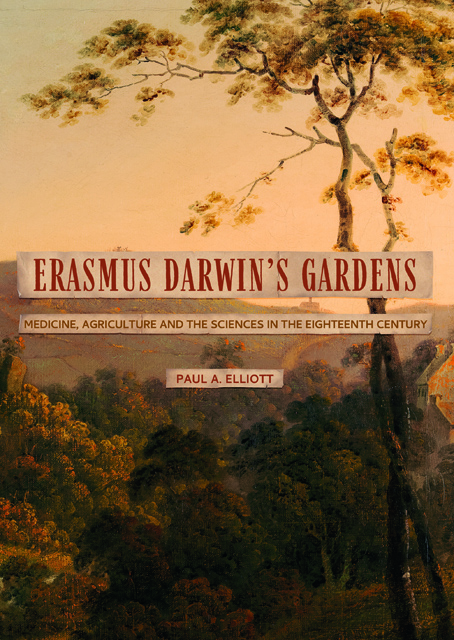Book contents
- Frontmatter
- Contents
- List of Figures
- Acknowledgements
- A Note on Plant Names and Identification
- Introduction
- 1 Lichfield and Derby Gardens
- 2 Medicinal Plants and Their Places
- 3 Agricultural Improvement: Enclosure and the Application of Science and Technology
- 4 Vegetable Physiology, Technology and Agriculture
- 5 Vegetable Pathology and Medicine
- 6 Among the Animals
- 7 Animal Diseases
- 8 ‘Eating of the Tree of Knowledge’: Forestry, Arboriculture and Medicine
- 9 Trees in the Economy Of Nature
- Conclusion
- Select Bibliography
- Index
- Garden and Landscape History
- Frontmatter
- Contents
- List of Figures
- Acknowledgements
- A Note on Plant Names and Identification
- Introduction
- 1 Lichfield and Derby Gardens
- 2 Medicinal Plants and Their Places
- 3 Agricultural Improvement: Enclosure and the Application of Science and Technology
- 4 Vegetable Physiology, Technology and Agriculture
- 5 Vegetable Pathology and Medicine
- 6 Among the Animals
- 7 Animal Diseases
- 8 ‘Eating of the Tree of Knowledge’: Forestry, Arboriculture and Medicine
- 9 Trees in the Economy Of Nature
- Conclusion
- Select Bibliography
- Index
- Garden and Landscape History
Summary
Erasmus Darwin spoke of protecting animals and plants against disease in Zoonomia (1794/96) and Phytologia in a manner reminiscent of his analyses of human health, tending to emphasise inherent propensities to illness and disequilibrium within organisms above external putrefaction or miasmas. While remaining a strong advocate of traditional methods associated with neo-humoural medicine, such as bleeding and purging, as with his human patients, he was usually measured and careful in recommending these and his success as a physician probably arose in part from his preparedness to let ailments take their course and provide prescriptions designed to bolster the animal system, such as greater provision of fresh vegetables and fresh air. His understanding of animal physiology and development was closely informed by medical practice, and his recommendations for improving farming using natural philosophy encouraged greater attention to the problems of animal and plant diseases, competitive provision and promotion of new treatments in the medical marketplace, which paralleled those available for humans, and more critical assessments of these. As we have seen, larger farms and farming methods encouraged by the agricultural revolution inadvertently, perhaps, fostered increases in plant diseases, at least to begin with. However, outbreaks of illness among farm animals were one of the factors behind the decline in small farmers and the increase in larger farms and great estates during the eighteenth century, which (it was claimed) coped more efficiently with such problems. Diseases were linked to small-scale farming and the grazing of cattle on open and common land, allowing them to wander unimpeded and mingle with the livestock of other farmers. In addition to increasing the efficiency of farming, enclosure and improvement were therefore also associated with improving livestock health.
Analogies between human and animal illnesses and the authority medical practitioners already had as experts encouraged farmers to consult them concerning their stock, as did the fact that some diseases, such as cowpox, were well known from ‘time-immemorial’ as spreading from animals to human. These practises were reinforced by the use of animal versions of human medicines, such as James’s Fever Powder, which was advertised and used ‘very extensively’ between 1750 and 1800. It was devised by the Staffordshire physician Robert James (1703–1776), a friend of Samuel Johnson and author of a Medicinal Dictionary and other works, including a study of canine madness, who took a keen interest in animal health (Figure 51).
- Type
- Chapter
- Information
- Erasmus Darwin's GardensMedicine, Agriculture and the Sciences in the Eighteenth Century, pp. 201 - 224Publisher: Boydell & BrewerPrint publication year: 2021

